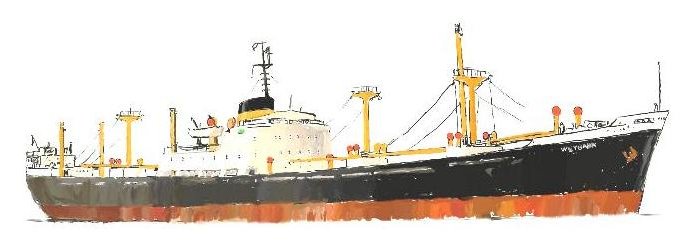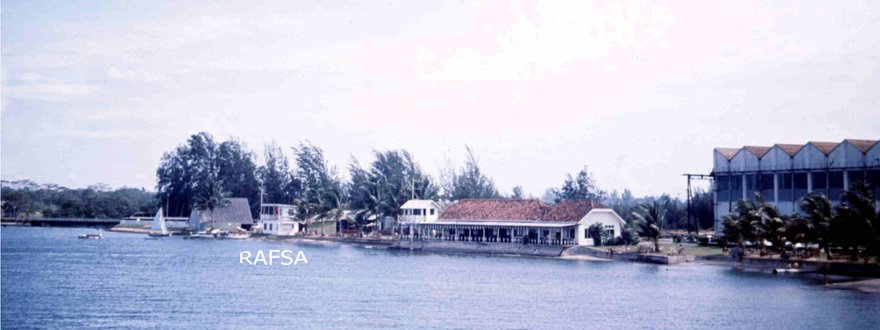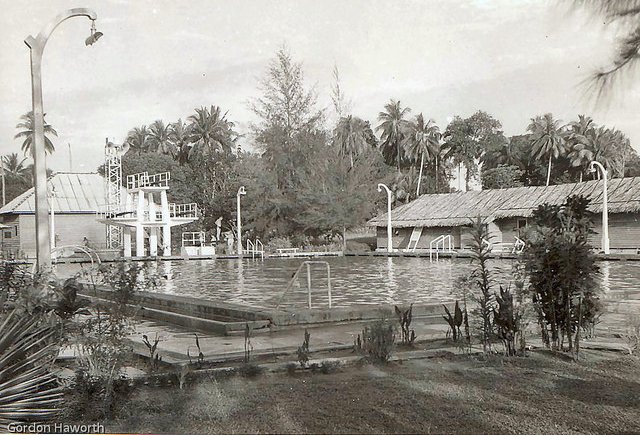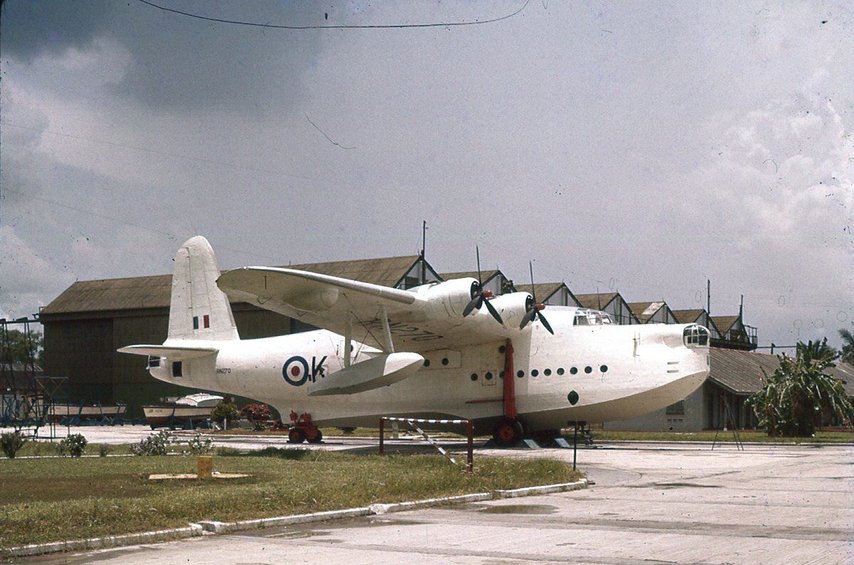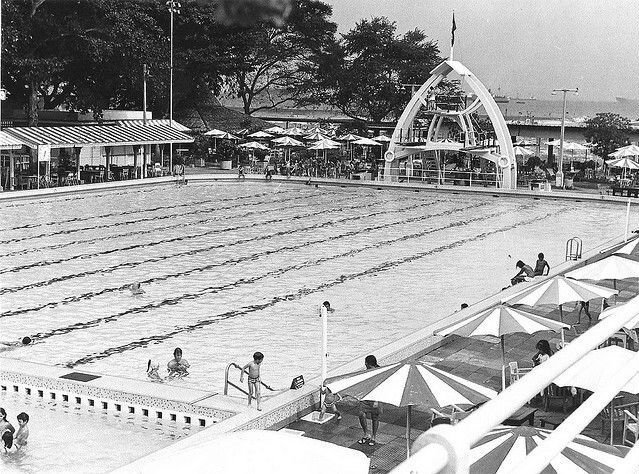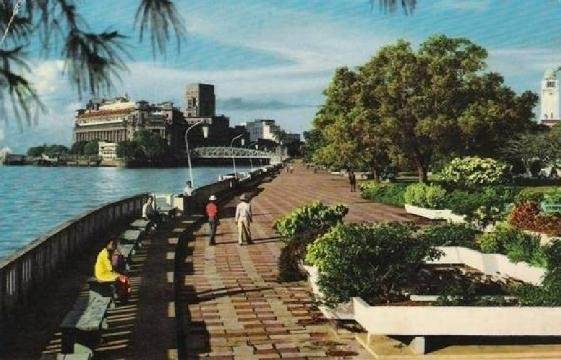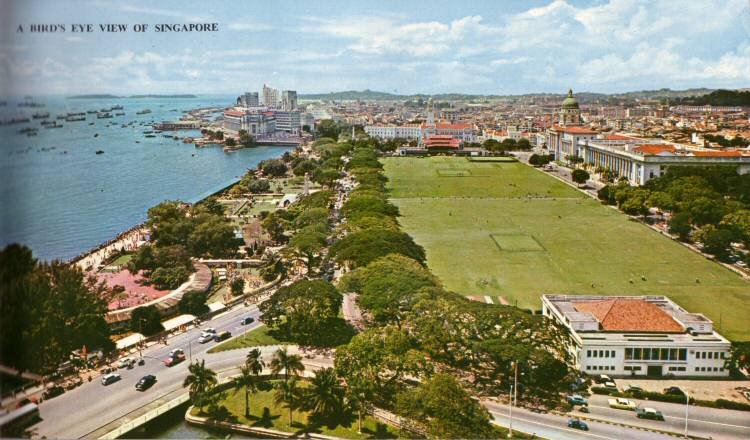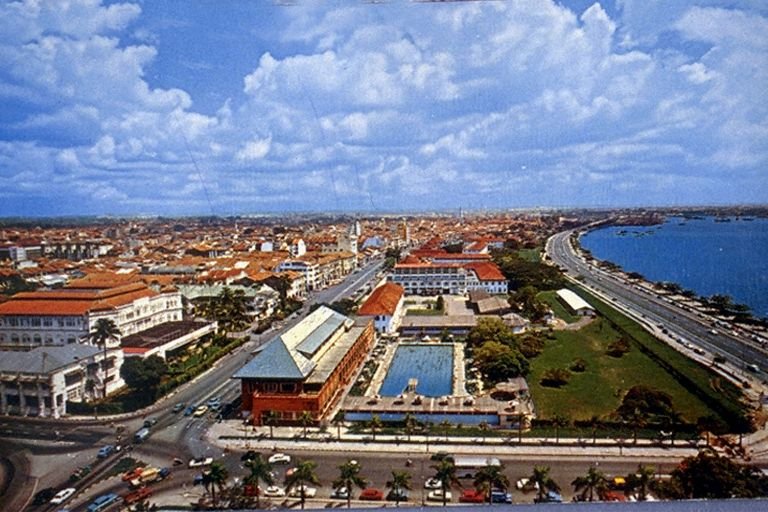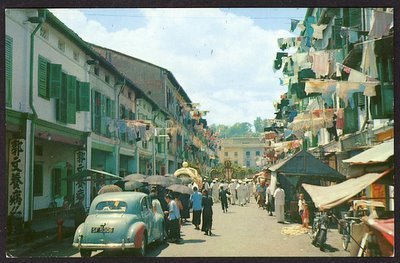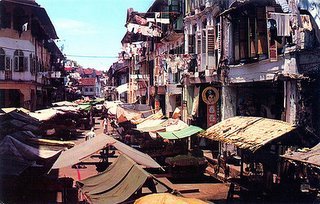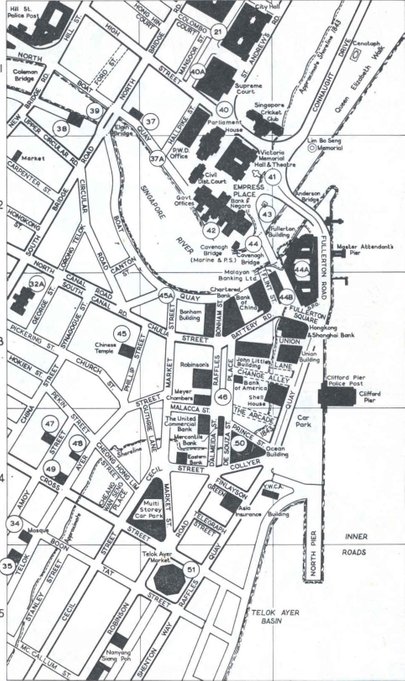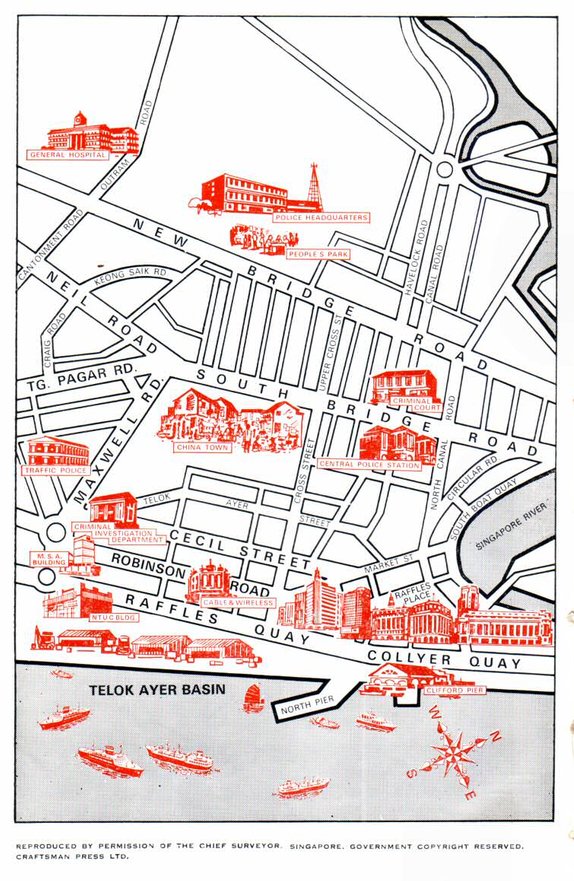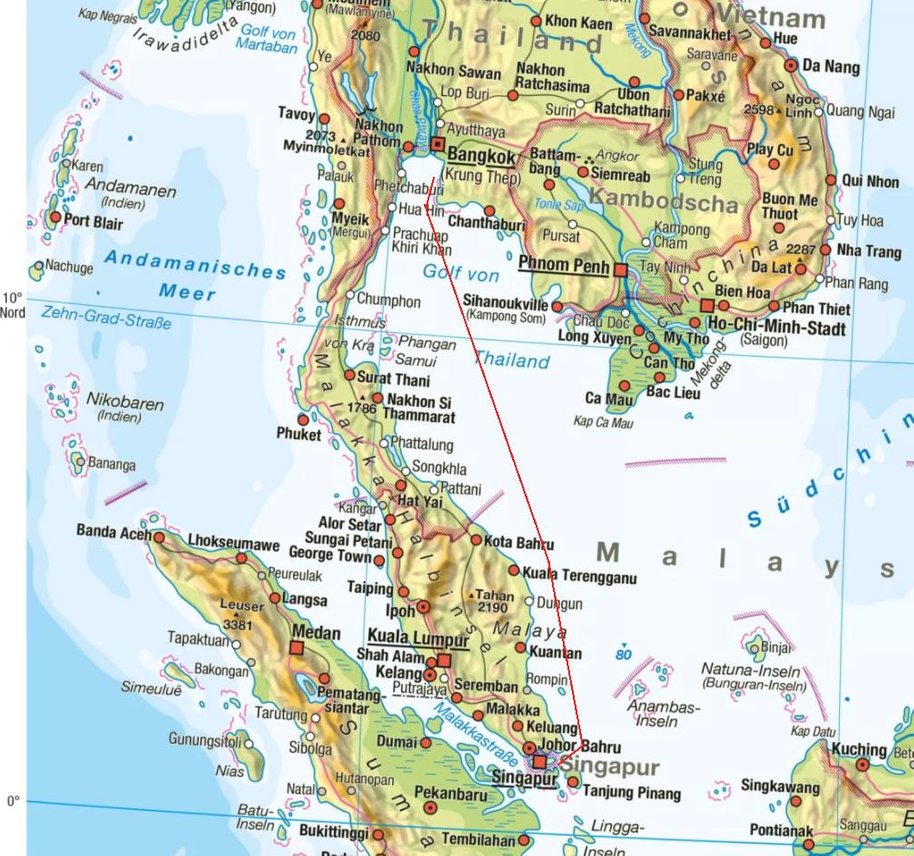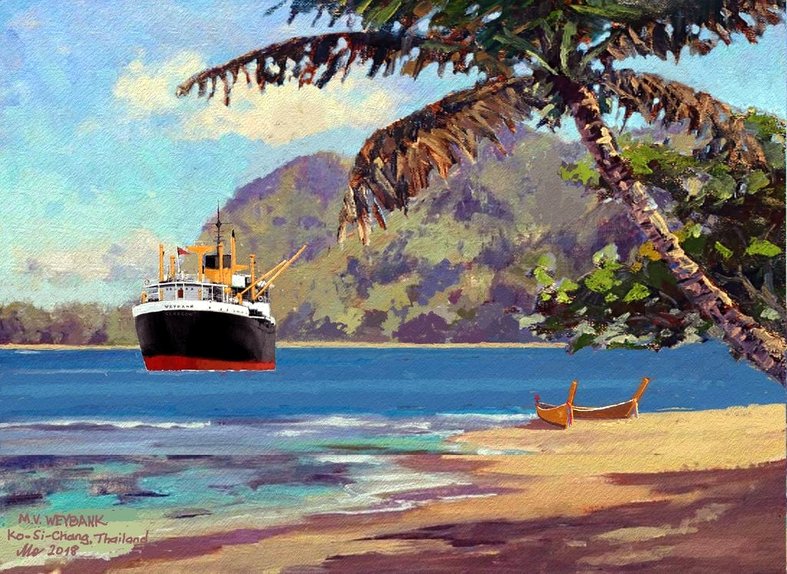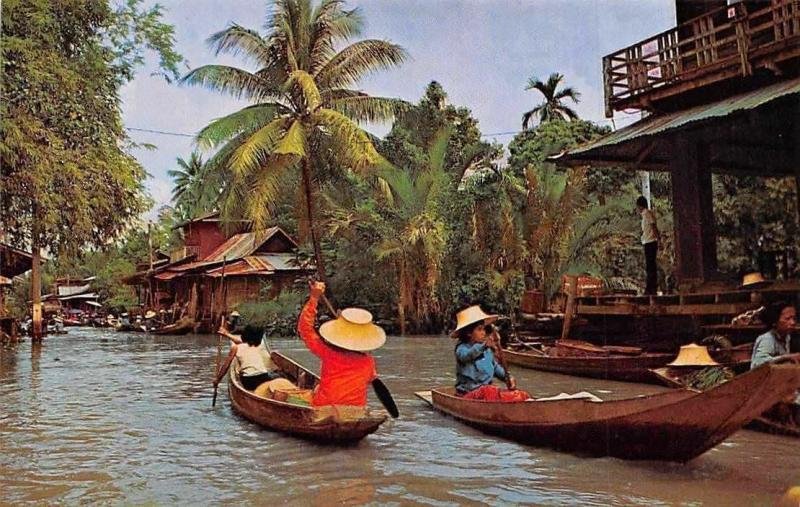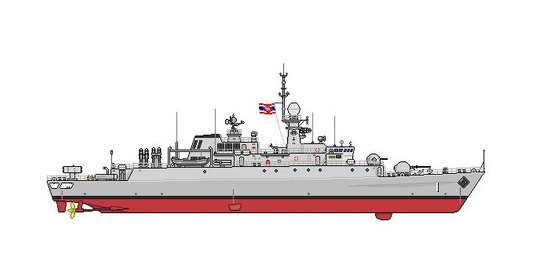Mandalay
M.V. Weybank - Chapter 8
Singapore (continued)
Below, a view of the yacht club taken from the pier‘s control tower. You can see a veranda running the length of the
club building. I remember an airman called Johnny Beal who was always on „Jankers“ meaning under miltary arrest. He would have to carry out his normal duties but in between repeatedly during the day (and night) report to the Guardhouse for inspection all kitted out and immaculate otherwise the MPs (Redhats) would find cause (which they did anyway) to increase his „time“. It didn‘t seem to bother him in the least. He always appeared at the YC just before sundown to have an „Anchor“ beer before having to report to the guardhouse. Sundown however was when the veranda lights shining down on the water below attracted not only fish but sea snakes and not just one of them but dozens.
Johnny hated snakes with a vengeance. He wore miltary shorts but would take off his boots and socks and grabbing a rock or whatever else came in handy, jump into the shallow water and splashing about try to bash in any snake he could get near to. Sea snakes are not aggressive (at least not to humans) but they are extremely venomous and their
bite was often fatal as could be read now and again in the „Singapore Times“. Out he would stagger, all messed up
and then off to the Guardhouse. On such characters the British Empire was built but on retrospection it‘s probably
why we lost it.
RAF Seletar swimming pool below:
.....and finally a parting shot from RAF Seletar of Sunderland K for kilo in all her glory parked on her trolleys in front of the yacht club (with thunderclouds building up above her):
Singapore City and Katong
By the time I was a 17 year old teenager, we lived Katong in a block of flats in Meyer Road called „First Mansions“ at the south of the island very close to Singapore City and just a couple of hundred meters down the road was the Singapore Swimming Club!
During weekdays a year long I attended the Singapore Polytechnic as the only caucasian among about 2000 other students, most of them Chinese, a few Malaysians and even fewer Tamils. The only European friends I had at the time were the sons and daughters of European diplomats or officials who flew down over the summer holidays to visit their parents for two months. In the summer holiday seasons I met a lot of European girls mainly French or German. I still remember the name of the German ambassador‘s daughter, Astrid Scheel and she was a beauty too. The French girls were not exactly slim but still filled out nicely the skimpiest bikinis they could find. They all seemed however to have the same bad habits – trying to imitate Francoise Hardy (who became a massive international chanson star at the time) and smoking Gauloises Caporals (black tobacco, strong and without filters) like locomotives. Combined with the garlic that was in just about every meal they eat reminds me of the song that starts with „Just one kiss and I, I was…..“.
The Singapore Swimming Club above.
What you can‘t see from the balustrade is the huge dance floor and restaurant in the building on the same floor. On the ground floor there was an open-fronted bar which had a lot of slot-machines or „One-Armed Bandits“ as they were called, the kind with a big lever on the right side which you pulled to get the cherries and pineapples etc. spinning. They seemed to for some reason or other attract women who would come in from the pool in
their swimsuits/bikinis, order a drink and then commandier a machine. It was a great place to „make contact“ depending on the intelligence and/or humour of the player. Siding up alongside with a „can I help you pull that“ could get you a flirtacious laugh or a beer bottle smashed into your face. I remember one evening when an irate husband came into the bar and demanded that in future they refuse his wife not only entry into the bar but also that she be prohibited from signing „chits“. You didn‘t pay for anything with cash at the club but instead signed „chits“ for the amount involved. If you wanted to play the Bandits for instance you would say to the barman „give me 10 dollars worth of coins“ and sign for them on a chit. At the end of the month the club sent the bill to the club member (if a married couple, the husband). She had just about bankrupted him but in all fairness a lot of the wives were left on their own for long periods of time and in many cases on purpose. They usually
became either a subdued mouse, an alcaholic, a sex addict or plain psycho and all they were seeking all along was just some attention.
At the Polytechnic we had classes between 0800- 1200. After 1200 you could either go to the library or whatever or go home. Most of the Chinese students after a midday meal at the Polytechnic restaurant went to the Poly library to swat up by themselves into the evening. Why didn‘t they go home? Because most of them lived in one or at the most two room „appartments“ together with an average of about 12 family or extended family members. There was no place to sit down and relax let alone study! Not only that but his family were paying for his education in the hope that his success would eventually help pull them all out of their situation. This loaded an enormous pressure on the poor student. His or her failure to pass the final exam would be a catastrophy with the added loss of face for all.
And I? Where did I go after 1200? You bet – straight to the swimming club. I had no pressure to succeed in the final exam because I knew from the start that I could not pass. The reason? Simple arithmetic! We were all studying to attain the Singapore PMG which would qualify successful students to serve aboard Singapore registered ships but the problem was that there was only a handful of them large enough to require a radio station. So why did the Polytechnic keep maintaining the marine radio faculty? Easy! The dropouts were scooped up by Singapore Govnmt. Telecommunications. Study your ass off for three years, sorry about that but how about slaving for us now that you‘ve got no other option?
So, back to the pool, 1330 at the latest! There were hardly any swimmers around at this time of the day except for a few women who obviously didn‘t mind the heat. Any husbands were away at work, as usual.
I had seen day by day an attractive woman at the pool and each time I looked towards her her eyes met mine instantly and always with a smile on her face. I could see that she was at the least over twice my age but I felt the electricity between us everytime she was at the club. I was only 17 at the time but fantasized about going up to her: „James, James Bond..“
When the UK summer schoolbreak came, an English boy about the same age as me whom I had met at the pool the year before had flown out again to visit his parents. We saw each other at the pool and after the usual „How‘s things?“ stuff he said „My Mum‘s here, come and meet her“. When we approached his mum and I saw her, I nearly collapsed in a heatwave. It was „Ursula“ - the woman of my dreams. I was in a mess and couldn‘t get out of there fast enough.
Only a couple of days later my friend (the same one) invited me to a party. When I arrived the flat was crowded and vibrating to the sound of the Rolling Stones‘s „Mona“ and the Beatles hits. With a „Tiger“ beer stuck into my hand I was propelled into the „Bachanalia“ . I was trying to ease myself out of the melange to light a „Chesterfield“ and at least get a little high on my beer when my friend came up to me and said „My mum want‘s to dance with you“ and before I could get my head around it – there she was right in front of me. The music changed suddenly to the slow „Save the last dance for me“ by which time she had both her arms around my neck and pressed her body in real tight. She was well endowed wearing a low cut cocktail dress, even more so at her back. Her perfume was also lighting my fuse. Then the lights went out (not mine, the flats) and then she
whispered in my ear „give me the works!“. Those few words turned me off like a light switch. She had used her son to get me to the party, put on the slow music and then turn out the lights. I can hear you thinking „he must have been mad turning her down“. I might have been young but I knew that if I got involved in an affair with her the news would spread like wildfire. My Dustin Hoffman chance with „Mrs.Robinson“. After that night she shunned me at the swimming club but after a few days she thawed and we would meet at the poolside and talk and that‘s when she told me about herself.
Although from reading the above you might think she was a loose woman, she was anything but – she was just very lonely and despondent and had tried in desperation to bring some happiness into her life. If I had been a few years older and financially independent I wouldn‘t have thought twice and I never forgot her - she even looked like Anne Bancroft!
Her husband was an RAF Sunderland pilot who was always away flying to Hongkong, or Kuching or Darwin or… enjoying himself with the lads and even in between his flights showed her no affection. She had refused to live within RAF married quarters in one of the bases, which is how she ended up in a flat in Katong.
Most of the married couples who went abroad to Singapore or Hongkong had never even left the UK before and a lot of them couldn‘t cope with the change in lifestyle. The woman didn‘t have to do any work around the house. An Amah (a paid servant girl or woman) or sometimes even two of them would do all the house cleaning, wax and polish the floors, do the cooking, the washing and even the shopping for groceries. The poor housewife couldn‘t even distract herself by watching TV because there was none to watch and add to that the temperature of around 30° the year around with high humidity but no air conditioning – just ceiling fans.
Some of the more athletic minded women occupied themselves by playing tennis, all day and everyday – never mind the heat – they all turned blonde with bronze suntans and lithe figures and with their tennis mini-skirts knew what a turn-on they were. Of course there was also the kind of woman who went off galavanting all day
(and in many cases all night too). If she had children the Amah would would end up becoming a surrogate mother to them.
Some of the husbands or wives would start having affairs with other wives or husbands. Not infrequently some army or airforce husband would start having an affair with the wife of an officer who outranked him with the result that he and his wife would both be sent packing back to the UK.
Chinese women who may have been in a similar predicament had another way to keep their dignity, providing they could afford it. Mahjong parties that would go through the afternoon and all of the night. A very rich Chinese woman lived two floors directly below us and she regularly held such parties. They played for money, big money! When they occured mobile food stalls would set up shop in the parking lot below and Chinese boys were continually going up and down the elevator day and night keeping them stoked up with food and drink. I can still hear the sound of the Mahjong tiles being reshuffled before the start of a new game. I used to meet this woman in the elevator and one day she invited me to a party (not a Mahjong one) at her flat. I nearly asked her if she had an attractive daughter I could marry but managed to keep my big mouth shut for a change.
When we lived in Seletar the „insurgency“ in the form of communist Chinese guerilias trying to infiltrate Malaya was in full swing and it took ten years before they were completely defeated. When I lived in Meyer Road years later, it was Indonesia that became the enemy as they started trying their hand at what the commies had failed in, calling it a „confrontation“ to avoid the „war“ word.
They started off by sending insurgents in small wooden sampans loaded with bombs to plant at strategic points in Singapore like electricity transformers or water works or stick mines onto ships anchored in the roads. The „insurgents“ weren‘t stupid and knew that they would be lucky to slip past underneath the radar of the RN patrol boats to get anywhere near the coast and if they managed it they just dumped the explosives on the beach and buggered off straight back home.
I was having a shower one morning in the Meyer Road flat when the skylight window at the top of the wall imploded in a cloud of glass shrapnel whizzing above my head followed by a „BOOOOOM!“. During the night the insurgents had planted a bomb on top of the low seawall across from the flat and activated its timer.
A few weeks later I was standing in the balcony in the early evening just before the sun went down waiting to see my father returning from work. Looking down on the length of Meyer Road I saw his car just as it left Katong village behind him when I saw his car lift up from the road and drop back down again on the opposite traffic lane. This was followed by a „BOOOOOM“ - another bomb planted on the sea wall further down the coast.
Things escalated and got bloody when the Indonesians infiltrated troops into Johore at the southern tip of Malaya (if I remember correctly I think they were parachuted in). It didn‘t take long before the army and RAF wiped them all out. I heard rumours that RAF Hawker Hunter jets had even dropped napalm on them. That was the final end of the Indonesian „confrontation“.
Some photos below of Singapore City:
The promenade above is the Queen Elizabeth Walk. The bridge spanning the mouth of the Singapore River is the Anderson Bridge and the building with the Greek type columns is the Fullerton Building.
Above on the left you can see part of QE Walk and towards the top the Fullerton Building. The large grass area is called the Padang where cricket, rugby and football matches were often played. The Singapore Cricket Club is the red roofed building at the far end of the Padang. The building at the top right of the Padang with a green dome is the Supreme Court and next to it the building with columns is the City Hall . The building closest to the viewer at the near end of the Padang is the Singapore Recreation Club.
If the viewer turned to face in the opposite direction he would see the following:
Above, the building with its swimming pool is the British forces Britannia Club and directly across the road to the left is the famous Raffles Hotel. The highway to the right is the Nicoll Highway which I took everyday to and from the Polytechnic. The flat I lived in was at the extreme right on the coast. Note the clouds gathering in the heat. The mornings were usually cloudless but by mid-afternoon you could start to expect thunderstorms especially in the monsoon season which could be spectacular and dangerous. One afternoon I went out on to the balcony to cool down as I thought because the sun was starting to come out that the storm was over when there was a massive flash/crack/bang and a big tree which stood across the parking lot was now nothing more
than a smoudering bit of trunk. The whole area stank of ozone and the hair on my head and arms was standing upright from the static.
Another time I was out on my boat fishing just off the coast near Katong when the storm clouds started gathering rapidly and an hour later the whole sky to the east had turned a dark blue. I was thinking „time to get ashore“ before it broke when suddenly I saw a hugh bolt of lighting about 500 meters away shoot from the sea up to the clouds followed immediately by an earsplitting crack. You never saw someone paddle as fast as I!
Below, Sago Lane in Singapore‘s Chinatown.
The photo below is of Sago Street (not to be confused with Sago Lane) in Chinatown in the 60‘s.
Above, an excerpt from the 1966 Singapore Map showing Change Alley where you could buy just about anything. Raffles Place and Robinson‘s department store – the city center.
The map below was supposed to be an aid to tourists in 1966. I include it because it shows the location of Chinatown so that you will know where I‘m talking about when I continue with the Weybank.
Finally, a photo of Keppel Harbour which lay to the west within easy walking distance to the city center. If you were real lazy you could take a Tri-shaw or even a taxi. The P&O liner „Chusan“ is getting up steam. On the other side of the pier is a Dutch cargo ship with a wierd superstructure and ahead of her lies a Norwegian freighter.
We arrived at Singapore around midday on the 29th December, tying up alongside in Keppel Harbour.
We had hardly got the gangway down when the customs and immigration arrived to clear the vessel - followed closely on their heels by a Bank Line Superintendent. For Bank Line Masters and Officers, a visit from a superintendent can be related to a visit from God. It didn't take long before all the officers were told to report to a meeting in the dining salon at 1600 hours. In the interim our smoke room started filling up with our officers and it was then that the subject of grieviances came up.They boiled down mainly to the state of the "cuisine" being served aboard and other things such as laundry, no movies etc.
As far as the meals were concerned I myself thought that all in all they were pretty decent although apart from breakfast I ate only curries myself. Laundry was another thing. Your steward would collect your dirty washing and take it down aft to the Dhobi Wallah.We were supposed to wear uniform "whites" in the tropics (white shirt, shorts and long socks) which however quickly picked up dirt and showed it meaning that to keep up appearences (like Mrs. Bucket) you would have to send it to the DW just about everyday.
What you got back from him was usually something else or at least looked like it. The 2nd and 3rd mates had come aboard the Weybank prepared. They ran around in khaki uniforms which of course showed the dirt much less and saved them on their laundry bills.
Around about the second time that we had visited Calcutta, the Chief Electrician Pat and I decided to go to an Indian tailor shop and get ourselves uniforms made to our own specifications. We both decided on dark jungle green shirts with breast pockets and facility for fastening shoulder epaulettes and we opted also for long jungle green trousers to complete our "ensembles". We each ordered three or four complete uniforms. A couple of days later the uniforms were ready and the "day of reckoning" arrived. That evening Pat and I marched into the dining salon hyped up for the battle which was sure to come. I sat down at the captains table with a "Good evening, Sir, Good evening Mrs.S." closely watching their expressions. There was an audible background murmuring coming from the rest of the officers waiting in expectation for the show to begin and it didn't take long.
Captain:"Sparks, is there something I don't know about? Did you join the army overnight?" (background sniggering accompanied by calls such as "can we call you Rupert now?" ( a "Rupert" being the derogatory term for an officer used by British troops)).This went on for the rest of the meal but the Captain, God bless him, remained his cool Peter Ustinov self. He could have made a real scene and demand that we dress according to regulations but he let us get away with it.
Returning to the smoke room "conference", my shipmates decided that they needed to elect a spokesman to air their grieviances to the superintendent and who did they elect by popular vote? Yes, me of course - not because I have any oratory gifts excelling in eloquence but for the simple reason that I was employed by Marconi and not the Bank Line.They thought correctly that if one of them became the spokesman it could quickly end up being detrimental to his career whereas I as a Marconi man could freely speak my mind ( which should read "speak their minds not mine"). I knew what was going on but agreed to do it on one condition. I said that the first thing the superintendent would ask me after hearing the first of the grieviances would be "is this just your own opinion or is there anyone else here that thinks the same?" and when he did would they show their hands? "Yeah, sure Sparks, what do you think of us, we're right behind you on this (they only forgot to say "Scouts Honour")“.
At 1600 the scene was set and the curtain raised. The Captain sat next to the Superintendant who then introduced himself and then started with his speech/State of the Bank Line Nation, the subjects of which went over my head. When he finished he asked if any of us would like to say something. He got the kind of questions that interested us the most like "when are we going home?" to which he squirreled out of by telling us he only knew where we were going to next – Thailand! Sailing tomorrow! (This torpedo instead of sinking us would have blown us high sky with joy if it had been fired around twenty years later. In 1968 airflight tourism was a thing of the future. None of us aboard had been to Thailand before. Like the rest of the UK any knowledge we had about the country only came from Yul Brenner in „The King and I“ - we were unknowingly soon to get an education!).
I had been gearing myself for the final "anything else?" and when it came I shot out of the blocks. His answer to the first grieviance was a question and it was almost verbatim to what I had said he would say. A deathly silence ensued while each of my shipmates were either looking down at the carpet, at the deckhead or through the ports avoiding eye contact with me. I almost thought that they had set me up but could sense that the super. had intimidated them and therefore I desisted from calling them out. To end the pregnant pause which followed I said something like "have a nice day - if you'll excuse me" and walked out of the salon and into the smoke room. About 10 minutes later the guys all trooped in sheepishly to hear my "thanks a lot for being right behind me - I really appreciated it!". After I had cooled down we were soon all good mates again, as if it had never happened. That is the secret of a happy crew - no bad apples amongst us and no grudges held.
Each and every one of us had our down days but each knew how to handle it in his own way. I myself would now and again just close my cabin door (which during daytime was always open at sea) to be alone until the dark cloud lifted which by the next day luckily always did.
I had since hearing that we were sailing the next day decided not to go ashore which, after all I have written above about Singapore must come as a surprise. There were a number of reasons: As Singapore lies just north of the equator the sun goes down and fast like a shutter at 1800 each evening and sightseeing at night in a taxi trying to cover my old stomping grounds did not appeal.
Any of my friends that I had on the island would have left as they were nearly all from the UK or Europe and all came from families whose fathers had three or four year contracts. Nothing is ever the same when you return and usually the reality dissapoints your memories. I therefore did not apply for any Singapore dollars.
I should have known better by now and alarm bells should have tolled when Donald came up and asked „Going ashore Sparks?“. I tried the „No, got no money“ but he took the wind out of my sails - „I‘m going ashore for a Chinese (did he mean woman or meal?), I‘ll treat you – take us to the best restaurant you know“ (at least now I knew he was talking about food). Donald has had a life changing experience? Offering something for free?
I was by then thinking „that‘s nice of you Donald“ and might even had said it. „Ok, wait till I get changed into civies and off we‘ll go“ said I.
I took him to Chinatown where you could eat your heart out. We went to Sago Street (photo above) which was crammed with food stalls on the street itself and also had a number of small restaurants in the buildings bordering the streets. These little restaurants didn‘t have doors facing the street but instead had shutters which were folded back like an open doored garage. The street was crowded by the time we got there and as Donald didn‘t fancy sitting in the middle of the bustle and noise he made a beeline for one of the „garage“ type restaurants.
Inside there were a number of metal tables and we were the only customers. The rear wall had a swing door with a port hole through which appeared a pretty and friendly Chinese teenager who showed us to a table and asked what we would like to drink. I asked for a Tiger beer and Donald the same but with a whisky chaser
(Oh! Oh! I thought, the night is young). She gave us a small menu in English and Chinese and then disappeared through the door to get the drinks.
„This is the life, Sparks“ said Donald. The girl came back with the drinks and took our order but before she could go Donald had already knocked back his whisky „and anotherrrr whisky please“ handing her the empty glass. I had ordered Chinese style – a lot of small side dishes filled with various „yummy“ stuff to accompany the main dish which in my case was fried king pawns in batter with fried rice. Seventh Heaven!
By the time we were finishing this course Donald had also vacuumed up a number of Tigers and whiskys which I lost count of. I had just finished my second Tiger feeling full and relaxed when Donald bent over close and whispered „Scchhparksh, aive got no money. Asshh sschoon ash the girl goes back thruuu the schwing doar, I‘m out of here!“ I must have looked like a rabbit caught in headlights. I followed Donalds eyes as his followed the
girl when suddenly he shot out of his seat and out into the crowd outside. I turned around, the girl was gone. „F…, F…, think fast!!!“ . I imagined myself surrounded in the restaurant by a mob of irate Chinese trying to explain „..but Donald invited me“. A no brainer, I shot out into the street.
My main objective now was to move as fast as possible through the crowd without drawing attention to myself and get off into a side street before the girl came out and started screaming. Nothing like a good work-out after a heavy meal! I was expecting the dreaded scream at any second when I saw a side street and quickly went for it. I knew my way around Chinatown which probably saved me. Getting closer to the harbour area the buildings
thin out and I kept looking behind expecting a car load of Chinese to screech up alongside and send me to my ancestors. The Chinese have their Triads (Mafias) which can also be hired to serve „rough justice“ instead of bothering with police, lawyers and court sessions.
What a relief it was when I managed to get back aboard in one piece. I went to look for Donald but his cabin door was locked and I couldn‘t find him – just as well for him at the time. The next morning I was expecting police to arrive with the girl for a „line-up“. Not as daft as it seems because the harbour police get a crew list of any vessel that enters the port. Thankfully it didn‘t happen, either because there were so many vessels
in port or at anchor in the roads and/or that the girl couldn‘t have known explicitly that we were seamen as there were thousands of British troops on the island who wore civies when „out on the town“. I felt so sorry for that poor Chinese girl. Probably working for her father slaving away in the kitchen behind the swing-door and I hoped she didn't suffer for not keeping her eyes on us. I felt so bad about it that had we not sailed just after noon I would have gone back and payed her.
As for Donald, I told him that he probably wouldn‘t be alive anymore if I had found him the night before and asked him to do us all a favour and join the „Foreign Legion“! I didn‘t bother asking him how he got back in one piece. Knowing him he probably didn‘t know either. Maybe he had even repeated his performance at some bar deciding that the night was still young.
Today, Singapore is apart from a few iconic buildings completely unrecognisable to me. Only the memories live on.
„Hi Ho, Hi Ho, it‘s off to work we go …..“. Next stop – Thailand!
Thailand
We departed Singapore just after midday on the 30th December heading in a north westerly direction through the South China Sea underway to the island of Ko Sichang which is just 10km off the Thai mainland in the Bight of Bangkok. Sailing up the east coast of Malaya and over the graveyard of the „Repulse“ and „Prince of Wales“ , it would take us two to three days at our 15 kt speed to cover the approx. 800 sea miles. Apart from celebrating New Years Eve on the 31st (which I briefly described in Chapter 4) the time passed uneventfully. On the approach to the island we had picked up a Thai pilot and I had to thereafter keep a medium-wave radio link open with the pilot station in Bangkok. The sun had already gone down when I heard the „Stop Engines“ ring of the bridge telegraph followed by the rumble of the anchor chain. We had arrived but I had to stay in the radio room to communicate with the pilot station about arranging for a pilot cutter to come and pick up the pilot. The radio room door was open and five minutes after the anchor was dropped I was tapping away on the morse key to the pilot station when I was distracted by a movement at the door which caught my eye. A barefoot Thai girl wearing hot-pant cut-off jeans and a shirt tied up at her midrift stood at the doorway with a smile on her face. I asked her what she was looking for to which she replied „you“. I told her to buzz off quick before she got herself into trouble which she did with a giggle. I was wondering „where did she come from and how did she get aboard so fast?“.
Once the pilot had left the ship I was able to close-down the radio room, more or less out of work until we sailed again. I made my way down to the accomodation deck wondering „where has everyone gone to?“ but then heard laughter coming from the engineer‘s port side. I followed what sounded like a party and arrived at the source. It came from the 2nd Electricians cabin which was the last one on the port side and closest to the main deck aft. The 2nd „Lecky“ who was a young and typical Geordie had a cabin that was twice as big as mine and it was full of Thai girls sitting on the daybed, bunk and on the deck while another troupe of them were singing and dancing Thai.
Half of them had climbed up ropes thrown up with grappling hooks before the gangway was lowered down the side of the ship. Their CEO, a Mama-San was also aboard for the duration as was their kitchen and cooks who set up shop on the main deck just below and aft of the 2nd Lecky‘s cabin.
We were anchored at Ko Sichang for at least five days and it was for us like being in Tahiti aboard the „Bounty“ . The less said about it the better without incriminating some of my shipmates, myself included. Well not quite, in revenge for what Donald had done to me in Singapore, I‘ll tell the following:
On a bright and beautiful morning about an hour before we were due to sail, I was walking down the engineers alleyway and passing Donald‘s cabin door which was open, I glanced in and stopped. Inside Donald was sitting opposite the mama-san and between them on his coffee table lay his big Akai tape recorder which was playing some of his favourite melodies ( „The Battle‘s Over“, „Highland Laddie“ and his absolute Desert-Island choice „Donald where‘s yer troosers“). I went inside and asked Donald sarcastically „found the love of your life at long last?“ to which he replied „it‘s not funny Sparks, she‘s here to collect for the girl“ (he should have said „girls“ because on our arrival after disappearing with his first choice he soon returned to the mama-san complaining „she‘s no good, give me another one“). „I‘ve got no money so I‘ve offered her the tape deck in exchange and she‘s checking it out“. I said something in between like „the wages of sin“ while he continued with „the tape decks f….d! I hope to f… she takes it and buggers off before…...“. At that moment the music stopped but she hadn‘t switched the tape deck off. The take-up spool motor had stopped running and the tape from the drive spool started to unravel like a snake gliding down the coffee table. Donald sprang up like a Jack in the Box, pressed the stop button and while reeling in the tape tried to pacify the mama-san with a „just a glitch, happens once in a blue moon“ . He had no other choice but to switch it back on again whereafter the tape immediately started to snake out as before.. He made a motion to press the stop button again but the mama-san shouted „No Touch!“ and we all mesmerisingly watched as the tape which appeared to have a life of its own made its own undulating way.
By this time the mama-san had figured out that she was being „taken to the cleaners“ (to quote one of Donald‘s favourite Glaswegian expressions) and she went ballistic which brought about half the ship‘s crew running towards the imagined murder scene. The star role of the final act of this Shakespearian drama was played by Stanley, the 2nd Engineer who with his charm and especially his money melted the scorn of the leading actress whom he gallantly thereafter escorted to the gangway like Blackadder aiding his queen ashore after a satisfying night together aboard the „Golden Hind“.
With great sadness we weighed anchor and headed off to Bangkok which was only a short distance away.
I would never have thought at that time that in the future throughout the 80‘s and 90‘s I would return again and again to work in Thailand often spending a total of six months a year there for contracts connected with Thai shipyards and/or the Royal Thai Navy.
Many of the Thai girls were beautiful and gracefull (although like everywhere else in the world they had their share of hard faced bitches too).
A lot of them were also very astute. As an example, many years later I lived in the Orchard Hotel in Bangkok and right next door to it was a big roofed-over „Beer Garden“ which had a long rectangular bar at the centre (and other bars on the sides). This garden was open from midday to almost sunrise the next and everyday and it was always crowded with Thai girls and music boomed non-stop. There were food stalls set up on the street outside and you could take your meal inside and eat it at the bar if you wanted. As soon as you sat down on a bar stool, if the one next to you was vacant it wouldn‘t be for long followed by a „what your name?“. If you didn‘t feel like talking with them they were still very hard to get rid of without being cruelly unkind. One evening I was sitting at the bar having a beer trying to relax after an unpleasant day at the shipyard when a girl sat down beside me and tried her best to get my attention. I wasn‘t in the mood and I kept ignoring her – big mistake. She shot up off the barstool and then pointing at me she shouted at the top of her voice „You! You! You f… like dog!“ and then with her eyes crossed and her tongue stuck out made a dog-panting sound. The instant she stopped I saw a glimmer of fear in her eyes, she thinking no doubt that she had gone too far but her act had been so funny that I burst out laughing whereupon she and then all the spectators started laughing too. The point was that anyone who had seen it would think that it was some serious kind of lovers tiff. I didn‘t ignore her anymore after that.
Bangkok
Bangkok (the „City of Angels“ „Venice of the East“) is built around the winding Chao Phraya river which opens into the Bight of Bangkok. We sailed upriver to the docks where we tied up and remained for the next three days. The dock area was fenced off but just outside the main gate the usual „seamens“ girlie bars had sprung up like mushrooms and for most seamen who might have intended to do some sightseeing I guess that was as far as they got.
Inside the dock there were guards patrolling to prevent thieves or girls boarding the ships but as far as the girls were concerned it was a waste of time as they boarded the ships from „Longtail“ water-taxis pulling up on the other side.
A khlong commonly refers to a canal in Thailand. These canals are spawned by the Chao Phraya, the Tha Chin, the Mae Klong Rivers and their tributaries. Khlong Saen Saep in central Bangkok is still today a significant thoroughfare in traffic-congested Bangkok's public transportation network.
Though it is unclear when exactly the phrase 'Venice of the East' was born, it is clear that no tourist guide since (book, person or website) has been able to resist this captivating cliche. Like Burma's 'Mandalay', it evokes the romance of the Orient, only Bangkok-style: of languid sampans drifting down tree-lined canals, of stoic locals living next to them in floating wooden shophouses, of city life before the advent of tuk-tuks and traffic jams. But does the Venice of the East still exist today? Yes and no. Many canals were drained or filled because of the risk of cholera they posed, or to make way for badly needed roads. Unlike the city's Chao Phraya River, little or no trade passes along those that remain. However it's not a tale of total stagnation. In places remaining khlongs are, though pungent, still picturesque. Old bridges survive, crooked houses still crowd the waters edge. For a few measly Baht (Thai currency) you can whiz past them, engulfed in noise and heat and fumes, rancid water flying toward you as the Longtail boat surges forwards (for speed and sheer exhilaration they put Venice's gondolas to shame!). Or take a gentle stroll along canal paths, peeking with every few steps into another home, stepping as you go over inhabitants shoes lined up outside them or past elderly ladies watering potted plants.
As this was at the start of the 70‘s, tourism in Thailand was still a thing of the future, or almost except that a travel agency called the US Armed Forces had in the 60‘s realised Thailand‘s potential along with that of some other countries.
Rest and Recreation (R&R) during the Vietnam War: All US military personnel serving in Vietnam were eligible for one R&R during their tour of duty (13 months for marines, 12 months for soldiers, sailors and airmen). The duration of R&R was five days leave in either Bangkok, Hongkong, Kuala Lumpur, Penang, Manila, Seoul, Singapore, Taipei or Tokyo. Due to their greater distance, seven days leave was permitted for R&R destinations Hawaii and Sydney. Bangkok was reportedly most popular with single GIs, Hawaii with married GIs planning to holiday with spouses.
The official policy of the United States Department of Defense was to suppress prostitution. Prostitution however, was relied upon by the US military to combat the battlefield trauma many faced. The popularity of bar girls was high because upon "rental", the GI would receive a legally enforceable contract. When a GI decided which girl he wanted, the girl would serve as his mistress, companion and guide for the length of his stay..
Pattaya Beach in Thailand, not far down the coast from Ko Sichang, was a fishing village until the 1960s when thousands of troops from Vietnam showed up for R&R, leading to the creation of one of the largest red light districts in the world. The heart of its economy remains to this day sex tourism. Soldiers sometimes called the breaks "I&I" for "intoxication and intercourse".
Years later in the mid 80‘s I worked at a Thai shipyard on the east bank of the Chao Praya where a number of Thai Navy ASW Corvettes were being built one after the other. As soon as one was built and ready for sea trials, it sailed down the Bight of Bangkok to guess where? Yeah! Pattaya, where it dropped anchor offshore. We the sub-contractors were driven down to Pattaya and booked into an expensive tourist hotel which lay in expansive gardens at the north end of the beach. If you had a girlfriend in Bangkok you could even take her with you. The hotel had a big bar in the foyer and a large outdoor swimming pool with diving boards. Pattaya had no docks or dockyards, only a short pier for taking tourists out on day trips to nearby islands (the sea water on Pattaya beach was by this time heavily polluted). The GI‘s had long since gone but in the interim the SAS and Swiss Air had replaced the B52‘s which had been based in Thai airfields by bombers of their own – sex-bombers. Pattaya was cram full of open-air bars with thousands of Thai girls. Not only in Pattaya, by this time every major city or town in Thailand had the same to offer.
(On the one hand it is Thailand‘s plague. Bangkok and the other tourist traps attracted girls from villages all over the country. There was no social security as we in the west know it. By the time a Thai wife had given birth to a 3rd or 4th child (birth control was not an option, there were no „Durex“ machines around and even if there were it would cost money they could ill afford) the husband would be long gone never to be seen again. As soon as the prettiest daughter was old enough, she would be sent to the city to try and make some money to help keep the rest of the family alive, buy the youngest school books, etc. etc. These girls would live together with four or five others in some dingy flat‘s single room „appartment“ sharing the rent, sleeping on air beds or skimpy matresses on the floor with all their wordly belongings stowed in cardboard boxes lining the walls.
Thai girls are fiercely independent and very few of them, very very few had any pimp controlling them. Those that lived together looked out for each other. They were all Buddhists and daily practiced their religion. However gentle and servile they could appear, if someone crossed them they could turn instantly into dangerous furies. For most of them their hopes evolved around meeting a „farang“ (a foreigner) who would fall in love with her, sweep her off her feet, marry her and take her back with him to Europe or the USA. It might sound like „fat chance“ but you would be wrong as many of them did and still do manage it. In some towns in Switzerland for example there are so many Thai-Swiss wives that they have managed to get their own community centres and Thai Buddhist temples built).
The reason why the corvettes would do their sea trials from Pattaya? The Thai Navy trials personnel, who would have to eventually sign acceptance on completion of successful trials, also moved into the same hotel for the duration and at the cost of the Thai shipyard. They also expected to be wined and dined each evening and the more Thai „girls“ around the better. Each morning we would all leave the hotel at 0800 (after feeding the baby elephant in the garden with bananas) and drive to the pier from which we would then be ferried out to the corvette. Off we sailed into the blue returning every evening at 1700 (like clockwork) before the sun went down. This was repeated every day for at least a month except for the two-day weekend break which allowed all participants to recover with some extra R&R!
On one of these month long sea trials the Thai Navy „convinced“ the shipyard that to truly test the vessel‘s capabilities they would have to sail down all the way to Songkhla Naval Base way down south on the Isthmus of Kra close to the Malaysian border and to really rub it in stated that on the way there they would make a weekend stopover at Ko Samui island (a very sought after holiday resort for affluent Thai tourists because it could only be reached from Bangkok by air). This excursion would add at least another week to to the standard four. When I complained to the Navy personnel that I had more pressing matters to attend to they asked me in astonishment „You don‘t want to go to Ko Samui?“ like in „ Are you somehow retarded?“. They said „OK, No problem, you can go back to Bangkok and wait until we return to Pattaya“, which I happily did to escape the madness. (One of the corvettes shown below).
(Continued in the following Chapter 9)
